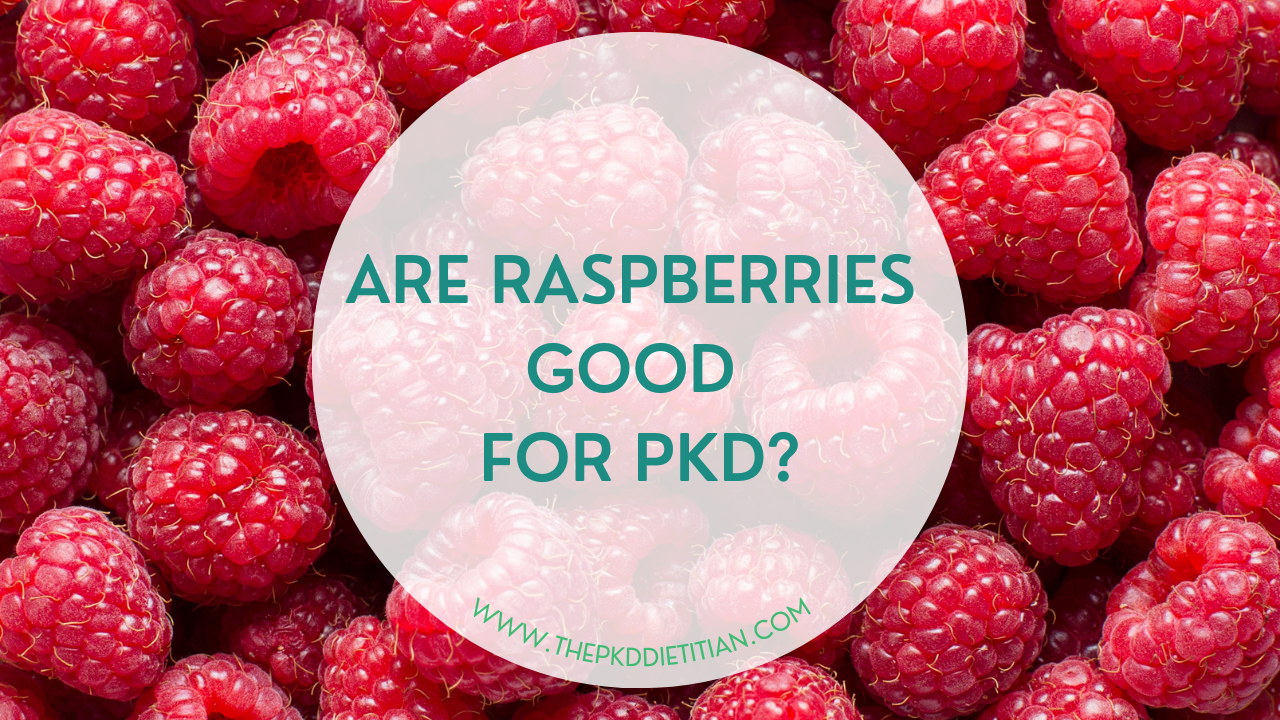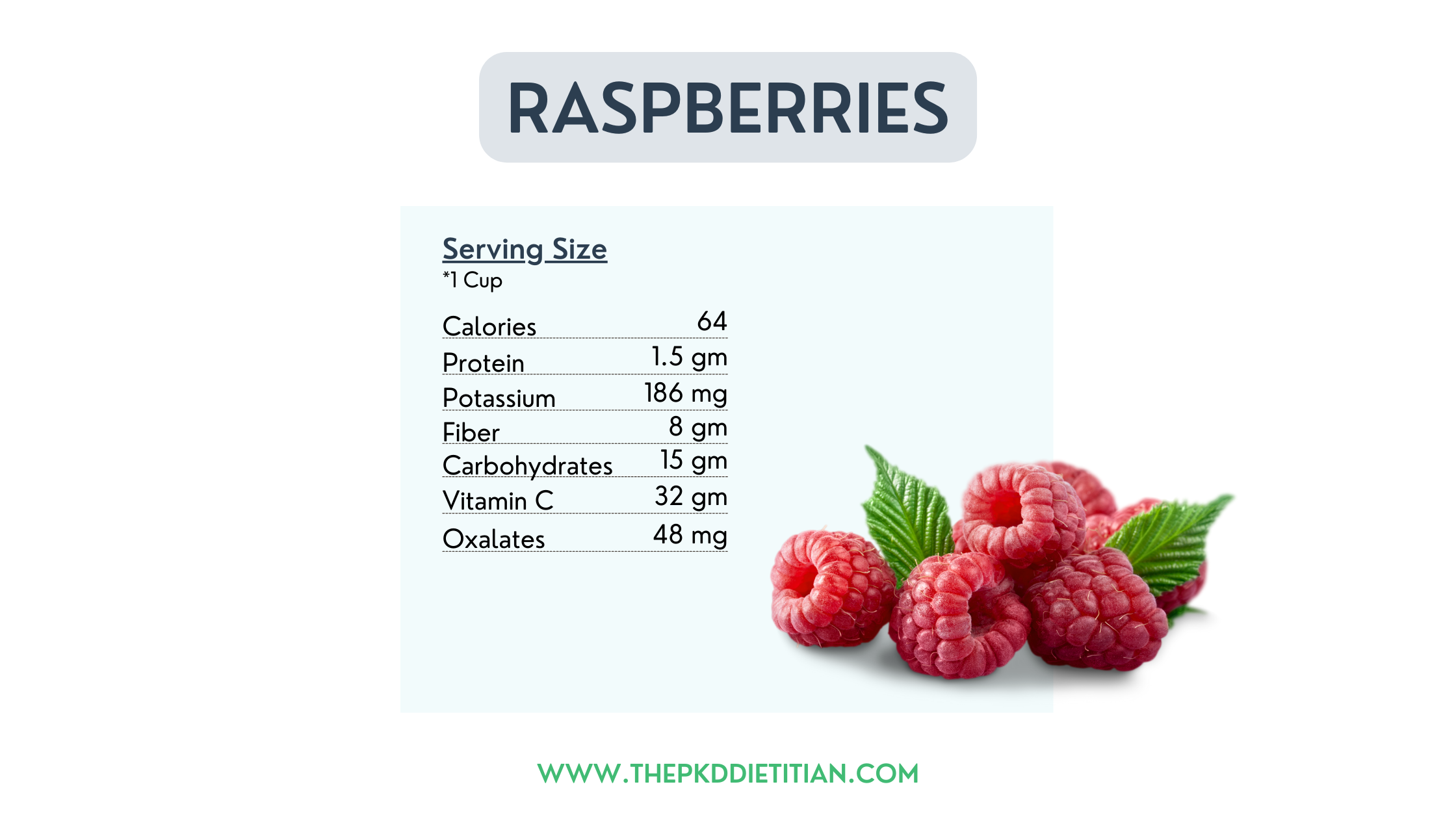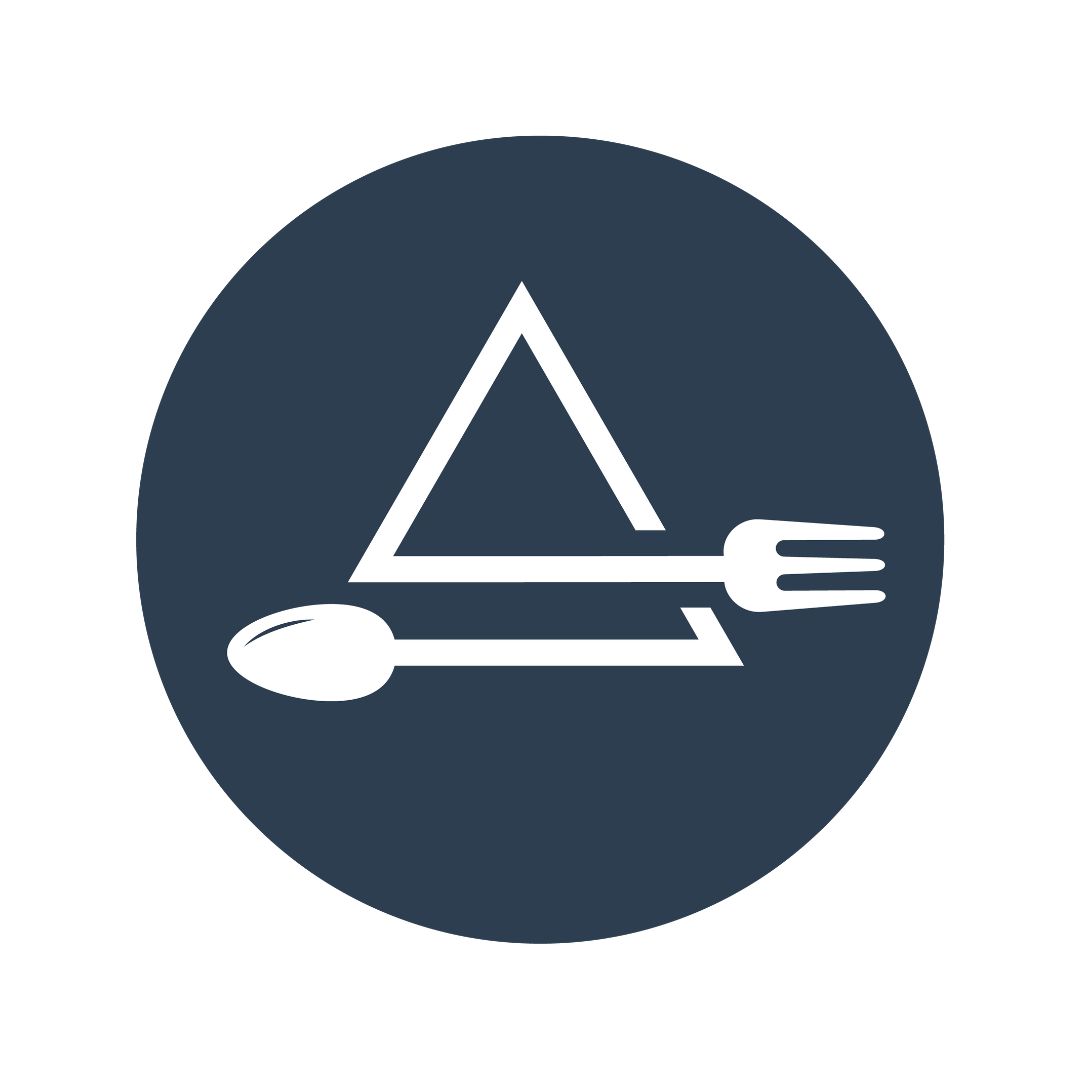
Should you eat raspberries with Polycystic Kidney Disease? Are they on the “good” or the “avoid” list for PKD? You might have even heard that you should avoid them because they contain some natural sugar or are high in oxalates. Let’s clear up this confusion once and for all. Read on to learn more about raspberries, how they can benefit PKD heath, and get clarity on if they will hurt or help your kidneys!
Raspberries, along with strawberries and blackberries, are the edible fruit of the Rosacea family plants. Yes, that’s the rose family! This delicate, and nutritional powerhouse of a berry comes in red, black, purple, and even golden colors. There are several different types of raspberries, the most common being the red raspberry.
These days you can find raspberries in the fresh and frozen grocery isles pretty much year-round. Raspberries are typically harvested in the summer and fall, from June to October, and are considered in season then.
Nutrition Profile of Raspberries
Serving Size: 1 Cup
-
Calories: 65 kcal
-
Fat: < 1 g
-
Sodium: 1 mg
-
Potassium: 186 mg
-
Total Carbs: 15 g
-
Fiber: 8 g
-
Calcium: 31 mg
-
Vitamin C: 32 mg
-
Oxalates: 48 mg
*Source: USDA FOODData Central

Benefits for PKD
Antioxidant-Rich
Raspberries are packed with antioxidants, which are naturally occurring plant compounds. They are particularly rich in Vitamin C which helps our bodies fend off free radicals and oxidative stress, protecting our cells from damage. (1)
Think of antioxidants as free radical scavengers in your body. Free radicals in the body are very reactive and cause damage. That damage is known to contribute to numerous diseases including diabetes, heart disease, and cancer. (2,3) Antioxidants, like the ones in raspberries, help to fight off those damaging free radicals.
Full of Flavonoids
Flavonoids, much like antioxidants, are natural compounds found in plants. There are different groups and types of flavonoids, each supports the body in different ways. In general, flavonoids have potent antioxidant properties and can help positively regulate inflammation.
Health benefits of including flavonoid-rich food sources in your diet include prevention of inflammation, prevention of heart disease, and even protection against cellular tissue damage. (4)
Kidney disease or injury, including that with PKD, is accompanied by long-term, low-level chronic inflammation. This inflammation plays a role in the progression of hypertension (HTN) and the progression of PKD. Diet can help influence and regulate this inflammatory response in a positive way. More specifically, a diet rich in antioxidants, and full of anti-inflammatory flavonoids. (5, 6,7)
Raspberries are rich in quercetin, a powerhouse flavonoid, which has been shown to reduce the inflammation connected with cardiovascular damage and disease. (8) Quercetin also helps to decrease oxidative stress in the kidneys. (9)
Heart Healthy
In addition to Vitamin C, antioxidants, and flavonoids, raspberries contain potassium and are naturally low in sodium.
Potassium is beneficial for heart health and blood pressure management. Not only does potassium support improved blood circulation, but it also helps keep your vascular system flexible, helping to prevent or improve hypertension (HTN).
There is a high occurrence of HTN with Polycystic Kidney Disease. HTN is often one of the first symptoms of PKD, showing up in many folks who are less than 30 years old. (10,11) Hypertension is a contributing factor both to the progression of PKD and cardiovascular disease associated with PKD. (12,13)
Poorly managed blood pressure is associated with having a larger kidney size, the total kidney volume (TKV). (14) Diet can help with blood pressure management but also with combatting the inflammation that often drives higher pressures. (15) Every dietary positive adds up, including the benefits contained within raspberries. This is Proactive, and Protective PKD Nutrition!
What About Oxalates?
It’s important with Polycystic Kidney Disease to not overdo your “food restrictions”. When there are too many foods on your “avoid” list you end up limiting your diet’s variety and nutrition. This isn’t good for PKD. Undernutrition is equally as detrimental to PKD health as overnutrition.
Oxalates are compounds, just like antioxidants, that are found only in plants. The difference is, as humans we don’t need oxalates. We don’t use them for anything in our bodies. They are a waste product. With oxalates, we want to eat and excrete them. Sometimes that doesn’t go as planned, for a multitude of reasons, and tiny crystals or larger calcium oxalate stones can form.
Excess crystals and/or kidney stones can both trigger the pathways associated with cyst growth with PKD. They also can cause direct kidney damage. (16,17) This is why, with PKD, you want to manage your oxalate intake. Not eliminate, not severely restrict fruits and veggies, but manage. It’s all about balance.
Variety is the way to go when it comes to fruits and veggies, that’s why I like to focus on the positives and perks of different foods for PKD. It’s not just about what you take away, it’s about what you are adding and including.
This includes oxalates and oxalate management. Yes, raspberries, have one of the highest oxalate loads of any fruit. One cup has around 48 mg (Harvard’s Oxalate List). But that is a heck of a lot of raspberries. To put this in perspective, I consider a single food item that has > 20 mg of oxalate to be on the higher end!
What Oxalate Management Looks Like With PKD:
-
Cut your portion down to 1/4 -1/3 cup of raspberries. This reduces your oxalate load to 12-16 mg.
-
When you eat raspberries, pair them up with other food items that contain calcium. The calcium binds those oxalates in your gut making sure they don’t get absorbed and filtered through your kidneys. For example, yogurt + raspberries.
Are Raspberries Keto Friendly?
If you are following a plant-focused ketogenic diet therapy for PKD, raspberries are a great lower-net carbohydrate fruit to include. They are naturally low in sugar, one of the lowest fruits!
Raspberries are higher in fiber, which helps support a healthy gut, but also helps make them low in net carbs. Net carbs are the digestible carbs that your body can break down and convert to blood sugar (glucose).
-
1/4 cup of raspberries contains just under 4 net carbs
-
1/3 cup comes in at 5 net carbs
Raspberries are a nutrient-packed fruit option for anyone following a ketogenic or a lower-carb diet for Polycystic Kidney Disease.

How to Add Raspberries to Your PKD Diet
A few nice combination ideas:
-
Smoothie: include fresh, or frozen raspberries + Greek yogurt
-
Parfait: layer yogurt + raspberries + walnuts + sprinkle with cinnamon
-
Salad: + raspberries + pecans + goat cheese
-
Oatmeal: + raspberries + walnuts + dollop of yogurt
Happy Eating,
Diana, The PKDietitian

Disclaimer: Blog posts are meant for educational purposes only. Information presented should not be used in place of advice from a medical professional. If you would like to work with Diana, The PKD Dietitian, please check out your opportunities at www.thepkddietitian.com or email her at [email protected]

